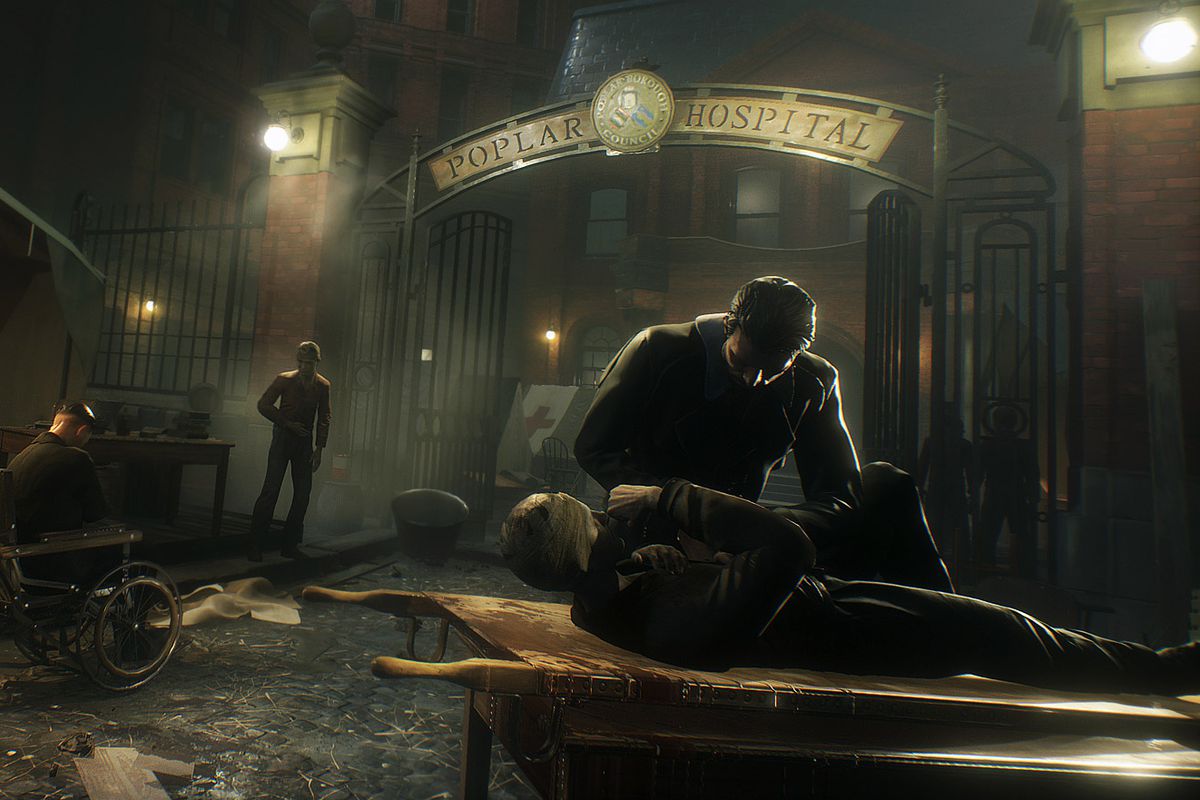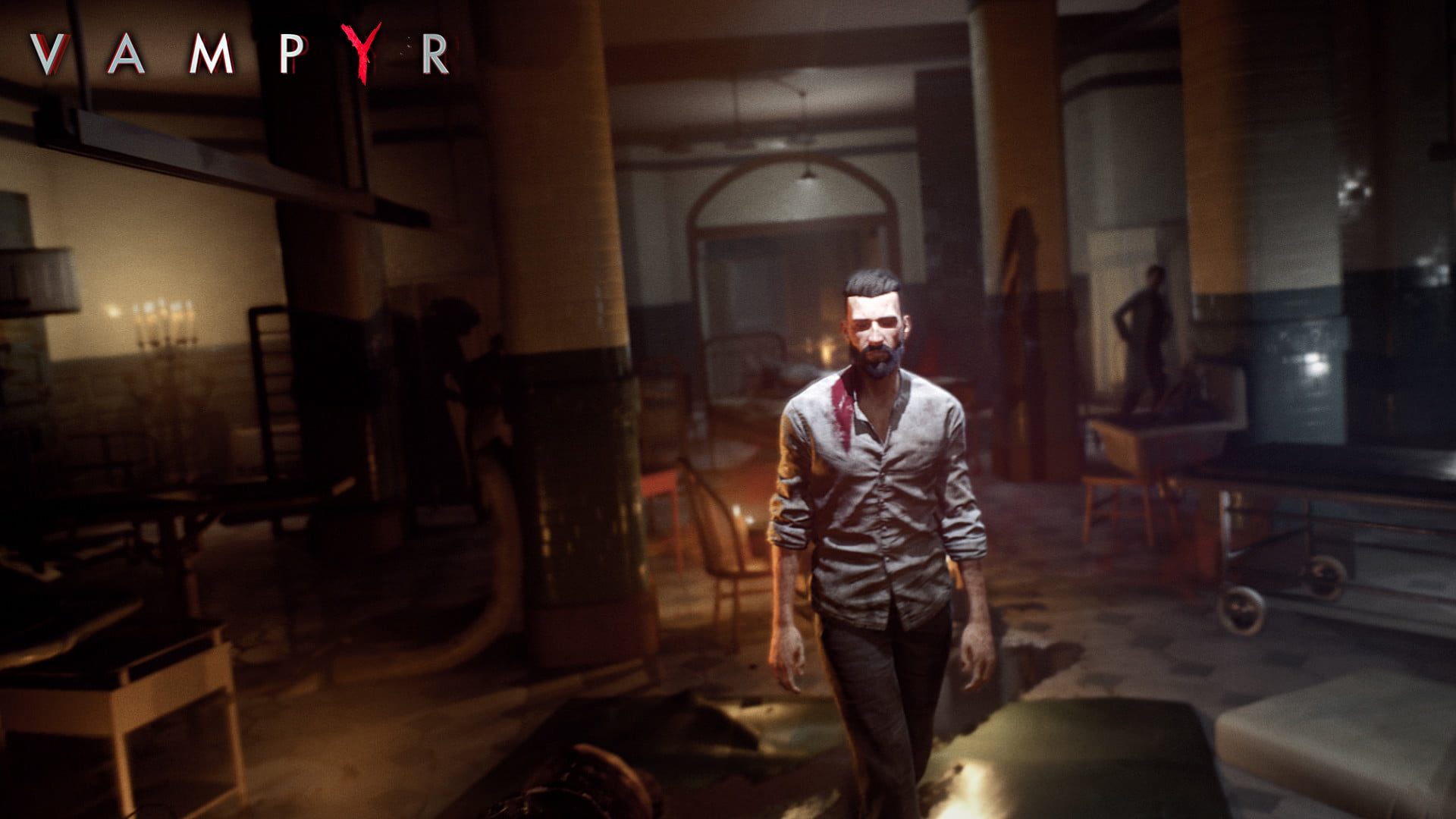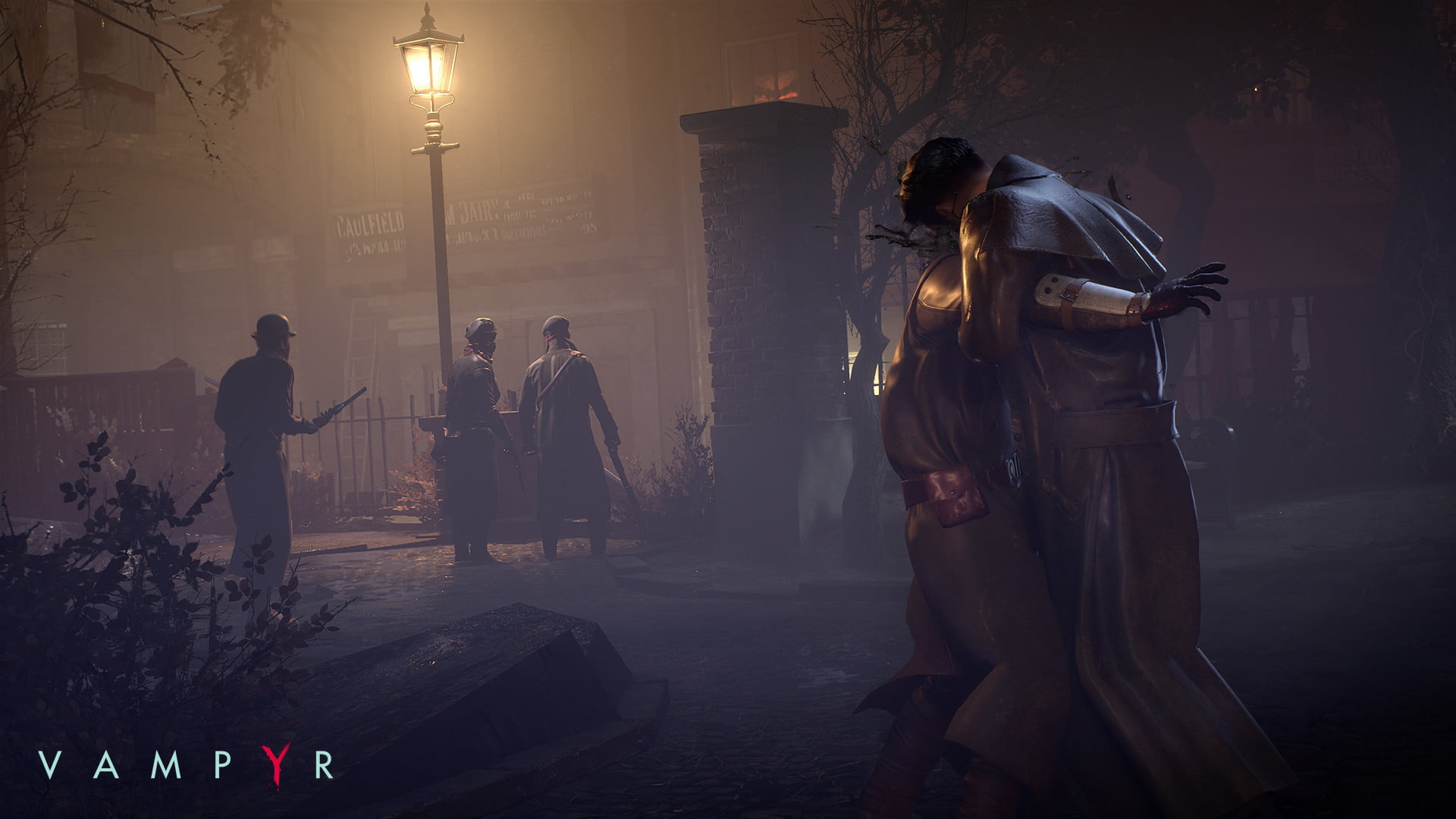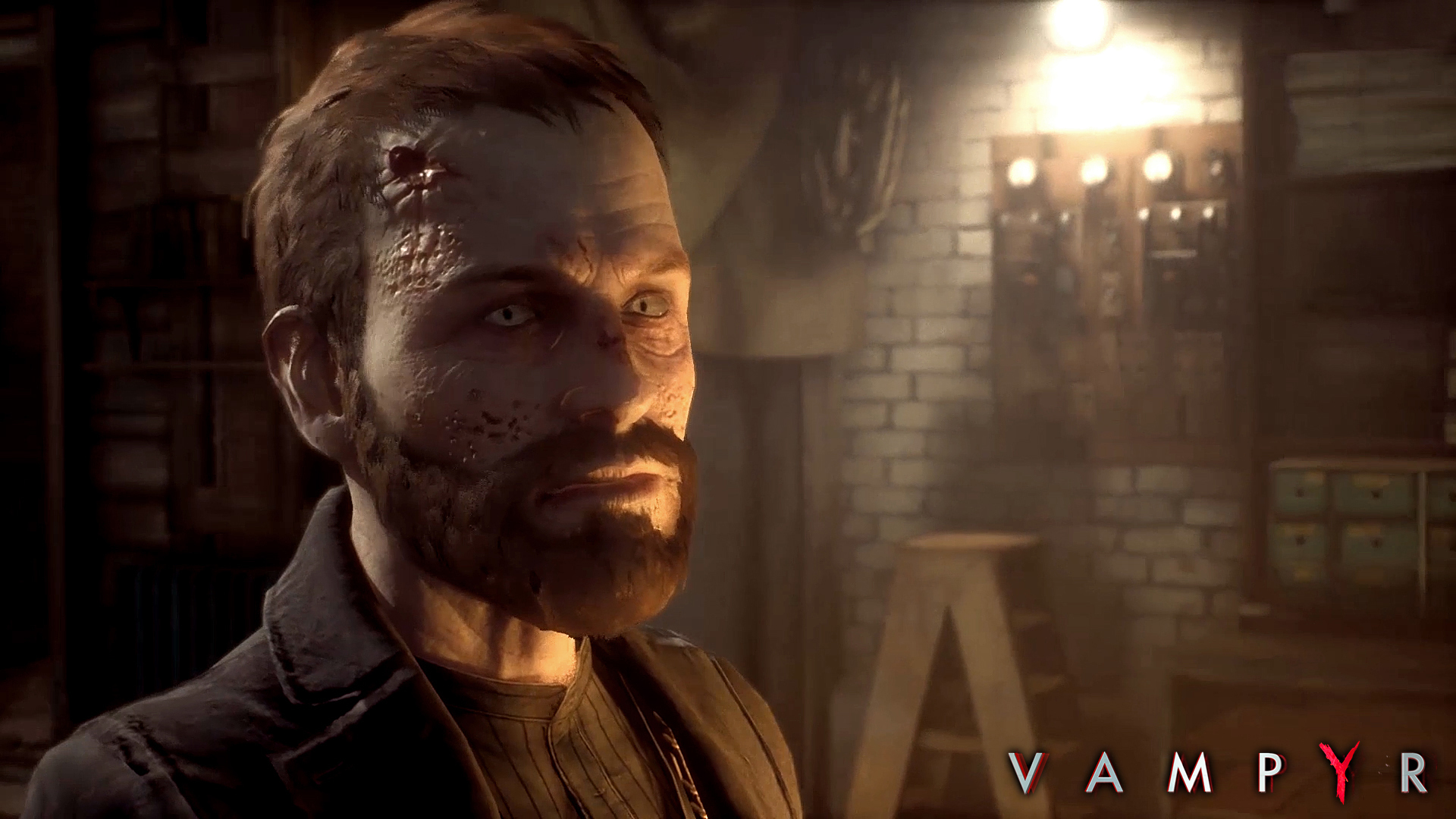Platforms:
Xbox One, PS4, PC
Released:
June 5, 2018
Publisher:
Focus Home Interactive
Developer:
Dontnod Entertainment
Set in 1918 London during the Spanish Influenza epidemic, Vampyr tells a dark fantasy story ripe with intriguing lore, moral dilemmas, and monumental amounts of death. In the aftermath of the Great War and at the height of death and disease thanks to the Spanish Flu, Vampyr’s setting is one that is both unique and unbelievably underutilised in gaming. This becomes especially true when a vampiric presence enters into the mix.
The game is a (somewhat) open-world experience where you roam the impoverished streets of London, talk to the local miscreants, and bust out your weapon of choice when things go south. It’s an Action RPG (role-playing game) with a big focus on narrative, dialogue, and moral choices.
Vampyr is developed by Dontnod, the studio who previously brought us Life is Strange. To go from a narrative adventure game set in an American high school to an ambitious open-world Action RPG set in a vampire infested London is certainly a big leap. So big in fact that I begun playing Vampyr excited, but also with trepidation. The game had me sold on its setting, time-period and promise of vampire lore. Although what really astounded me was how capable the game’s combat, questing, and world design ended up being too. Quite frankly, Vampyr as a game is astonishingly good. It’s far better than anybody could have possibly expected, coming from an indie studio with very little experience in the genre.

The game’s narrative and lore is captivating. Dontnod have done a fantastic job creating their dark fantasy world and building upon previous vampire myth. Those who have previously engaged in any World of Darkness lore will see some similar concepts in Vampyr, but also something fresh and new. Exploring sub-plots of the game such as the different mutations of the vampire disease, the effects of holy symbols on certain undead, and the powerful societies who operate in the shadows – it’s all so satisfying.
You play as Dr. Jonathan Reid, a renowned medical doctor and scientist. As a doctor your role within a Flu infected London is pivotal. You’re knowledge and capabilities within the field make you an invaluable fighter against the invisible enemy. On the flip-side, you’re also a newly born vampire, thrown into the world with so many questions and a thirst only quenchable by rich, human blood. The game immediately creates a duality of purpose – two opposite yet equally important identities that seemingly can’t exist in symbiosis. It’s within that duality that your character is forced to live, constantly testing his own morality. It’s a simple yet powerful premise that has created one of the best morality systems I have ever seen in gaming.
“Drinking the sweet, rich blood from this man’s flesh would be so easy, so justifiable, so inconspicuous”
The game forces you to question your morality and will adjust depending on your decisions. It’s a game I highly recommend people play at least twice, purely to see the outcome of your altering behaviour. Very early on the game will tutorialise your first potential victim. A man stands alone, injured after just getting into a savage fight. Talking with the man reveals a little bit more about him – he is not a great person. Drinking the sweet blood from this man’s flesh would be so easy, so justifiable, so inconspicuous -but is it the right thing to do?
Vampyr doesn’t have any difficulty settings because the difficulty is decided by how many innocent lives you take. The more blood you suck, the more experience you gain, and the more points you can put into passive and active abilities. As somebody who was determined to play the game as a morally righteous person, I can say first hand that my morality was tested. Vampyr can be a very challenging game at times, and that difficulty continues to rise as you approach the end. There were multiple moments where the difficulty was getting to me and a little voice in my head was persuading me to kill for that precious exp. There was one boss battle in particular where a mortal was trapped in a vampire on vampire battle. During that fight the mortal was guaranteed to die. Either you drained his blood to benefit yourself or your foe would do the same. Once again I found myself in a moral dilemma. The man was going to die anyway so it may as well be me who gets the upper hand in the fight, right?
A man has been turned into a savage beast. Do I kill him to stop him from potentially harming others, or do I spare him because he appears to be living peacefully even if it goes against the typical behaviour of his kind? It’s these kind of moments that had me incredibly impressed with Vampyr. It wasn’t always easy to do the right thing, nor was the right thing always obvious. Although the game reacts to your decision and at the end of the day you will see the consequences of your actions.
When it comes to RPGs, combat is often the weakest part of the game. So many games within the genre are forgiven for having mediocre if not bad combat mechanics, simply because the game is more focused on questing, exploration, narrative, and progression systems. With that in mind I was actually shocked by how competent Vampyr’s combat is. Locking on to an enemy, dashing out of their attacks, and leaping in with a strike of your own. The combat is frenetic yet controllable. Throw some vampire abilities in to the mix, parrying, staggering, and sucking blood mid-combat, and you’re left with a fairly unique and fun fight. Unfortunately the targeting mechanic didn’t always work perfectly. When multiple enemies and dashing enemies joined the fight I would often find myself spazzing out a bit as targeting tried to keep up with their movements. It could be quite bewildering.
The game’s visuals could be equally hit and miss. I love the Gothic style to the world around you but the character models could look quite dated. Occasional visual clipping errors and frequently awkward conversation animations were among some of the distracting sights within the game. These imperfections are easily ignored, however I would have preferred if the developers went for a slightly more stylised approach to their art direction and forgoed that more realistic aesthetic.

Outside of combat and narrative, Vampyr also introduces some rather intriguing additional mechanics into the experience. Talking with NPCs and exploring the world can unlock additional conversation options for the characters you come across. The more you unlock and learn about people, the more informed some of your decisions will be. The more you talk, the more side quests you will pick up as well.
Each NPC has their own personality, life, social circle, and health status. As a doctor you can go around curing people of disease and doing so will have a roll-over effect. Every time you sleep (which is required to level up) you will awake to see the aftermath of all of your decisions and actions. Cure a lot of people and the area will begin to stabilise. Allow disease to spread and suddenly that region will plummet into chaos.
There are a lot of additional mechanics like this and for the most part they all work really well together. The game does have a lot of dialogue although I never felt overburdened by it. Talking with NPCs was engaging and I knew I could always walk away and do other things if it ever dragged on for too long. I will say that the game occasionally felt like busy work, especially if you were exploring an area for a clue, running from region to region pursuing side quests, or walking around trying to find a single NPC that you needed to heal. Although for a game with as much complexities as Vampyr, these are very small criticisms.
What I think is the most astounding thing about Vampyr is just how ambitious it is as a project. I said it earlier and will say it again. This game is remarkably good for such a big project and such a small development team. The amount of unique and creative ideas found in Vampyr is a delight to see, but I never expected them to be implemented so elegantly or for them to work together quite so well.
Positive:
- One of the best morality systems in gaming
- Combat is surprisingly competent
- Intriguing setting and captivating vampire lore
- Great atmosphere
- A lot of unique mechanics working together well
Negative:
- Targeting can occasionally go wild
- Visuals are hit and miss
- Some busy work required
Going from Life is Strange to Vampyr is a bold choice. The developers definitely bit off a big chunk, although it certainly wasn’t more than they could chew. You will see some of Life is Strange reflected within Vampyr – plenty of dialogue, moral choices, focus on narrative. Although Vampyr then reaches a lot further and incorporates new ideas that all somehow work cohesively together. The way the game handles morality was particularly impressive but the thing that will leave me recommending the game to everyone I talk to is the setting and lore. It’s a mature experience that takes place in a time period very infrequently explored. It then provides a vampire narrative that’s unsettling, intriguing, and engaging. Get your stakes and garlic ready, because this is a vampire tale worth uncovering.










